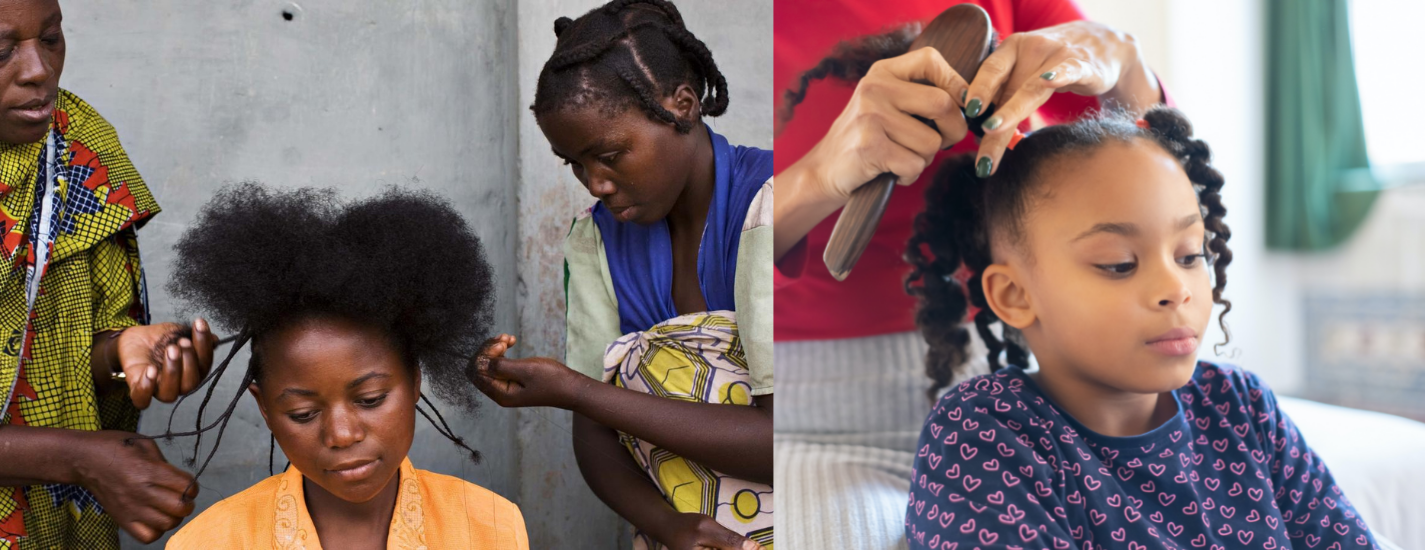
Racial equality: Black hair and Black History
A live session from Jamaica during which students will learn about the history of Black hair and why it is important to respect it.

A live session from Jamaica during which students will learn about the history of Black hair and why it is important to respect it.
Duration : 30 mins Max Size : 50 Destination : Jamaica
Category : Global Equality Recommended For : K-12 Schools
Subject :
Difference in appearance and visible traditional wear (and more importantly, a lack of awareness about them) have been a leading cause of racial incidents in schools. Our sessions aim to create awareness about the traditions and practices in different cultures through live, virtual sessions delivered by presenters from the countries where a particular tradition originates.
The natural hair styles worn by children of black ethnic origin have made them the subject of racial comments and discrimination. This live, interactive session brings awareness to the history of black hair so that those from other backgrounds can respect this tradition. On this session, students will travel to Jamaica where our local presenter will take us on a tour to meet local women. The locals will give a demonstration of the local traditional wear and hairstyles.
During the session, students will learn about the history of African hair, how things have changed over the years, and why it is important for us to respect what has been an integral part of black history.
Students will learn how a lot of meaning was attached to hairstyles in early African civilisations. A person’s family background and social status could be determined by looking at their hair. Warriors are said to have worn braided hair when going to war. More than 11.6 million Africans left the continent due to the transatlantic slave trade and took their customs along with them. Students will learn how, even though slavery was abolished in the 19th century, many black people felt the pressure to fit into mainstream society and started styling their hair to be straight. This involved the use of chemicals that caused much long term harm. Recent studies have linked the ingredients in relaxers, which chemically straighten hair, to uterine fibroids, cancer, and other illnesses. Given the natural texture of the hair, it also meant a lot of maintenance.
Over the last few decades, there has been growing consciousness amongst those in the black community about wearing hair naturally again. This saw a proud return of braided hair, dreadlocks and the afro. However, since these made people look visibly different, this also led to discrimination. A number of cases have been recorded around the world including those of athletes being forced to cut their hair before competing, students who were turned away from school and being the subject of verbal abuse.
The New York City Commission on Human Rights recognised the problem of discrimination based on hair or hairstyle with guidance that classifies restrictions in schools and workplaces as racial discrimination. The guidelines point to the rights of people to maintain their “natural hair, treated or untreated hairstyles such as locs, cornrows, twists, braids, Bantu knots, fades, Afros, and/or the right to keep hair in an uncut or untrimmed state.”
Over the course of this session, students will gain an appreciation and respect for customs and traditions including that pertaining to hair amongst friends from the Black community.
 Joel Mombilo
Joel MombiloJoel Mombilo is a professional guide for cultural tours in Cape Town. Although he studied financial accounting at first, he soon found his passion in the tourism industry and pursued an education in travel and tourism. He has had the opportunity of working with various large tour operators, and says his travels through the different provinces of South Africa and its neighbouring countries, expanded his experience. Ever since, he has wanted to share his love for the city of Cape Town and the country as a whole, to global tourists. He has always been fascinated with the lovely rainbow nation's history, rich culture, diverse flora and fauna, and finds joy in spreading facts and stories about them with visitors from all over the world.
This session accommodates up to 500 students. Once you book this experience, we will send you a confirmation email with a link to join the session. Students and teachers can log in from their individual classes or congregate in one single class/hall and access the tour via the link provided.
Write a public review